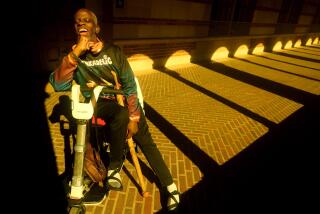PEOPLE : Proxy Eyes and Ears : CSUN proctors serve as vital communication links for disabled students at test-taking time.
- Share via
Elaine Sinaisky will “take” about a dozen exams at Cal State Northridge during finals week from Dec. 12-17. But Sinaisky, who graduated with a bachelor’s degree in English literature in 1983, won’t supply the answers and isn’t concerned about grades.
As a proctor for the Office of Disabled Student Services, Sinaisky supplies the eyes, hands and sometimes the patience for disabled students who need help when taking tests.
“A proctor has two jobs--to read the questions and write down the answers,” said Sinaisky, 52, who lives in Northridge. “I really have to be careful not to be the mind for these kids too. If I know the subject well, I have to be mindful to not give clues away through facial expressions.
“I don’t want to take away their sense of confidence. These students worked hard to prepare for their tests. They have a right to stand on their own merits.”
CSUN’s disabled services office, formed in 1976, began proctoring exams for students in 1980. The office now serves 750 students with disabilities that range from cerebral palsy and speech impairment to blindness and dyslexia. Nearly 300 tests are proctored during finals week by a staff of eight paid student proctors and three volunteers.
The office began using volunteers after Sinaisky, a former elementary school teacher, offered her help in 1985. “I had always admired the work proctors did when I went to school because it exposed me to the disabled in ways that weren’t possible in everyday settings,” said Sinaisky, who proctors about 15 tests, ranging from physics to French literature, each semester. “There was always a sign-language interpreter in class or some other proctor. It really opened my eyes.”
Proctor coordinator Jan Kinyone said proctoring is a talent that can make or break a student’s success when taking an exam.
“First and foremost, proctors need the willingness to work with disabled students,” said Kinyone. “They have to be very exact, enunciate clearly and delineate small things--like the difference between a parentheses and a bracket in an algebraic equation.
“Elaine has the kind of personality that makes students feel comfortable. They’re already apprehensive about taking tests and don’t want to worry about getting an adequate translator. She’s also good at separating out cheaters from those who are just having a hard time with their disability and need to ask probing questions. That can be a fine line.”
Robert Stigile, blind since an eye disorder at age 6, said he’s had problems with other proctors who cannot spell. “The proctor can be really reflective of your work, so it’s important to get one who’s sharp,” said Stigile, a recreation therapy major. “You only have so much time to take a test so you don’t want to stop and explain what words mean or how to spell them.
“Elaine has a lot of expertise in English, so she pronounces things very clearly. She’s really thorough.”
Sinaisky said she has learned volumes about the disabled since she began proctoring, and has also learned about her own limitations. Being disabled does not make a person “special,” said Sinaisky, who discovered the same range of character traits in the disabled as she has found in able-bodied people.
A self-described “techno-moron,” Sinaisky once proctored exams for a physics student with cerebral palsy who grew frustrated with her lack of proficiency in the subject. “I finally told him that he couldn’t do anything about his limitation, but I could do something about mine,” said Sinaisky, who eventually learned to spell and pronounce difficult physics terms. “He asked me to proctor him the next semester in French.”
Although Sinaisky said she has mastered proctoring for physics and French literature, there’s one subject she won’t tackle.
“The only exam she’s refused to proctor has been to dissect a fetal pig,” said Kinyone. “We have a student with cerebral palsy whose hands aren’t equipped to do that. We’re still looking for a proctor who’s willing.”
More to Read
Sign up for Essential California
The most important California stories and recommendations in your inbox every morning.
You may occasionally receive promotional content from the Los Angeles Times.













